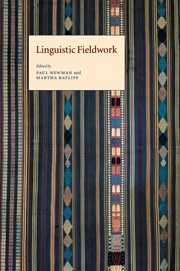Book contents
- Frontmatter
- Contents
- List of figures
- List of tables
- Notes on contributors
- Introduction
- 1 Fieldwork as a state of mind
- 2 Who shapes the record: the speaker and the linguist
- 3 Places and people: field sites and informants
- 4 Ulwa (Southern Sumu): the beginnings of a language research project
- 5 Escaping Eurocentrism: fieldwork as a process of unlearning
- 6 Surprises in Sutherland: linguistic variability amidst social uniformity
- 7 The role of text collection and elicitation in linguistic fieldwork
- 8 Monolingual field research
- 9 The give and take of fieldwork: noun classes and other concerns in Fatick, Senegal
- 10 Phonetic fieldwork
- 11 Learning as one goes
- 12 The last speaker is dead – long live the last speaker!
- Index
4 - Ulwa (Southern Sumu): the beginnings of a language research project
Published online by Cambridge University Press: 05 June 2012
- Frontmatter
- Contents
- List of figures
- List of tables
- Notes on contributors
- Introduction
- 1 Fieldwork as a state of mind
- 2 Who shapes the record: the speaker and the linguist
- 3 Places and people: field sites and informants
- 4 Ulwa (Southern Sumu): the beginnings of a language research project
- 5 Escaping Eurocentrism: fieldwork as a process of unlearning
- 6 Surprises in Sutherland: linguistic variability amidst social uniformity
- 7 The role of text collection and elicitation in linguistic fieldwork
- 8 Monolingual field research
- 9 The give and take of fieldwork: noun classes and other concerns in Fatick, Senegal
- 10 Phonetic fieldwork
- 11 Learning as one goes
- 12 The last speaker is dead – long live the last speaker!
- Index
Summary
The story which will be told in this chapter is not the story of a mature and fully established language project. Rather, it is a report on the very beginnings of a program of research on an indigenous language of the Nicaraguan Atlantic Coast. It is a before-and-after study, so to speak, reporting on the events preceding the researcher's first field trip and contact with members of the language community, the research done on the trip itself, and the outcome in relation to future stages of the project. The language involved – called Ulwa, or more loosely Sumu – is the southern variety of the Sumu group. The northern variety, now called Mayangna, is documented in Norwood (1997). It is to this latter variety that the term Sumu was generally applied until recently.
Ulwa is spoken primarily by inhabitants of Karawala, a town of 935 near the mouth of the Rio Grande, the large waterway that separates the Northern and Southern Autonomous Atlantic Regions. Some 30 residents the nearby town of Kara also speak Ulwa. At Karawala itself, there are Ulwa speakers, according to a recent survey, but most young members of the Ulwa community itself no longer use Ulwa, as Miskitu is the primary language of the town (for details, see Green and Hale, in press).
- Type
- Chapter
- Information
- Linguistic Fieldwork , pp. 76 - 101Publisher: Cambridge University PressPrint publication year: 2001
- 7
- Cited by



